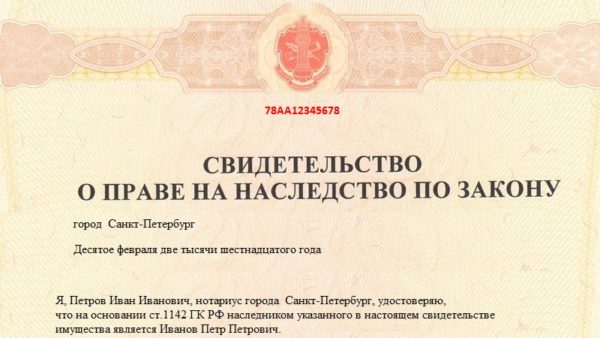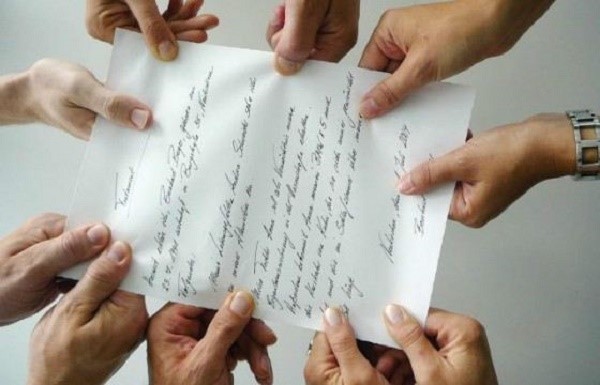Tax on the sale of an apartment received by inheritance: who is exempt from payments?
The conditions for obtaining real estate are different. Depending on them and many other factors, tax legislation provides for each specific variation in the deduction of tax fees to the treasury. In particular, many citizens are interested in how to pay tax when selling an apartment received by inheritance, whether there are any additional tax fees. In this article, we will answer all your questions.
Before wondering about the sale of an inheritance and the payment of tax fees from the funds received after the sale, you must first enter into the appropriate status and really become the owner of the desired housing.
According to the letter of the law, a citizen can only inherit an apartment that the testator was the official owner of. In fact, he owned the housing, and this circumstance was supported by the relevant document on the passage of the official state registration procedure, as well as other related papers.
If the housing was not privatized by the testator, the heir cannot receive it, because such property does not pass to relatives in the order of inheritance. In this case, it does not matter whether a will was made or whether the estate of the deceased is distributed according to the degree of kinship of the relatives claiming to receive property.
When it comes to cooperative apartments, another peculiar limitation is implied. Such property can be inherited only after the full payment of the share has been made.

If in your case no circumstances preventing the legal transfer of the apartment into possession were found, you have every right to become an heir and further sell the received property
Grounds for inheritance
According to the letter of the law, a person named heir of a deceased person is eligible to receive this status based on the following two reasons.
In the first case (the most common), in order to receive part of the property of a person who has gone to another world, it is necessary to have family ties with him. At the same time, we are talking about a certain proximity of the desired relationships, which allows us to form a certain order of inheritance.
In other words, the inheritance must first go to:
- spouse
- children;
- then parents;
- siblings or brothers.
However, if the deceased did not have any of the above list of relatives, distant relatives can also apply for funds. So, it is not uncommon for nephews, cousins, aunts and uncles, and other relatives to become heirs. Since there was no one closer to the testator, due, for example, to his advanced age or bad character.
Second option receiving an inheritance - to be inscribed in the will of a dying person. It is reasonable to draw up the desired document even if the family of the person leaving for another world is friendly and loves each other, in view of the fact that it actually speeds up the possibility of obtaining funds, while avoiding various bureaucratic delays.
At the same time, the degree of kinship between the testator and the people whose names are indicated inside the will does not matter. Sometimes we are even talking about the complete absence of blood ties. Often we watch films in which cunning swindlers "rubbed" into the trust of rich elderly people or their own lovers in order to be in their will and, after the death of the testators, leave with suitcases full of money. This is because anyone can become a testamentary heir.

If a dying person did not specify his own child in his will, then he will not get anything.
Real estate can be passed into possession in the form of an inheritance not only to one person, but also to several. This circumstance is determined depending on several factors:
- how many heirs are included in the will;
- how many heirs are allowed under the law without a will;
- whether there was a writing of a refusal to receive the desired property;
- whether some applicants were found unworthy of receiving funds as a result of litigation;
- whether there are those citizens who have the right to a mandatory share.
Compulsory receipt of a share is a special right recognized for citizens who lived in the same living space (which is inherited) with the testator permanently, while being dependents and unable to work independently due to:
- health conditions;
- respectable age;
- minority and similar circumstances.
Tax payable upon becoming an heir
Earlier in Russia there was a state fee called the inheritance tax. However, today, when receiving an apartment from the testator, it is not charged. We talked about this collection in detail in one of the articles.
There is a list of property items, upon receipt of which it is necessary to pay the required tax fee, however, residential premises (apartment) are not included in this list.
However, becoming an heir is not completely free. Upon receipt of housing from the testator, in order to enter into a legal status corresponding to the situation, it is necessary to pay the so-called state fee. After its payment, the citizen receives an official paper - a certificate confirming his right to receive an inheritance.
Inheritance procedure
A long process of inheritance of material goods starts at the moment when the close person to whom they belonged until now dies. As soon as the death is declared, the heirs enter into the right to receive real estate by registering it as a property.
To become a full owner of an inherited apartment, you need to go through the following steps.
- First of all, go to the notary's office. There, draw up a statement saying that you are ready to enter into the process of accepting the inheritance and certify it. The notary will give you a list of papers that you need to collect and submit to his office in the future.
- Pay the state fee required to obtain a paper indicating that you have the full right to receive the testator's property. Some time after paying the fee, you will receive the certificate due to you.
Note! These stages must be completed within six months from the day the testator leaves for another world. Documents are collected by each relative or close person of the deceased who claims to receive the desired real estate or a share in it.
To receive the property, be sure to prepare the following package of documents.
- Technical passport for real estate. The execution of this document could be handled by another testator who had gone to myo. However, sometimes such documents are lost or damaged. If this happened in your situation, contact the technical inventory bureau for a new one. The time period required for the preparation of the required document is usually about 5-7 business days.
- Information about each citizen who has a residence permit in the specified living area.
- Agreement for the purchase or receipt of an apartment in another legal way, concluded with the previous owner of the property, that is, the deceased relative of the heir. If the housing was bought, then it will be an agreement on the sale and purchase, if received as a gift, then a deed of gift and similar papers. If the apartment was assigned to a specific person after the trial, then the notary must receive a court decision transferred to paper as official evidence.
- Evidence of an appraisal of the value of the desired housing. The procedure for determining the price is carried out directly on the day when the testator died.
- Official confirmation of registration of housing as property.
As soon as all of the above documents are at the notary, and he confirms their satisfactory condition and compliance with all the requirements, the recipient of the material benefit will go to pay the state fee. After the funds are transferred, he will receive a certificate of the right to enter the inheritance. This paper must also be submitted for verification to the notary's office. If the state fee is not paid, the issuance of a certificate will not occur, as well as entry into inheritance.
As soon as six months from the moment of the death of the relative who bequeathed you the apartment blows, the notary will formalize the inheritance.

Acceptance of an inheritance
Another feature of inheriting real estate is that the citizen who is the heir is obliged to accept it. If you had no idea that your beloved relative had departed to another world or missed the time period given by law to become the owner of the material goods remaining from him, do not despair. You have every right to challenge the situation in court, and restore the six-month period set for you.
In addition, without a will it is very difficult to cope with the procedure for determining the circle of heirs. This usually applies to the following people:
- blood children born immediately after the testator died;
- dependents living in the same apartment as the landlord.
If you inherited an apartment and then sold it, and it turned out that there were persons similar to the citizens listed in the list, the transaction through the court may be declared invalid or, most likely, it simply will not take place.
In order to obtain any guarantees of the legality of the transaction, it is necessary to check and find all the citizens who previously lived in the desired housing. In addition, it is necessary to find applicants for inheritance and obtain a written refusal from them. In some cases, they can be negotiated, however, it is unlikely that anyone in their right mind will refuse to receive a share in real estate.
Do payments of personal income tax depend on the method of obtaining real estate
In the previous section of the article, we found out how to become an heir, what funds must be transferred in favor of the state in order to acquire the desired status, and stipulated many other important nuances.

Now that you know how to become the full owner of an inherited apartment, you can plan further actions related to it. So, you can move into it, rent it out or sell it. In this section, we will tell you how the income tax payments of an individual change if the apartment being sold was inherited by a citizen.
We are in a hurry to please citizens who were expecting a tax increase and upset those who were waiting for it to be lowered: cash payments to the state treasury for personal income tax do not change in any way due to the method of obtaining real estate put up for sale.
The fact is that the imposition of the required fee upon the sale of living space is carried out regardless of the source of its receipt.
Personal income tax payments when selling an apartment
Payments of tax on the income of an individual are made by citizens who inherited apartments in the same way as the rest who received housing in other ways.
Table 1. Current tax rates
Recall that the status of a resident does not depend on the nationality of a particular person. A foreigner can be a resident, and a native Russian can be a non-resident. It all depends on the time period, a certain number of days, during which a person must be on the territory of Russia. Today, the current period is 183 days per year. It turns out that if a citizen is in the country even 182 or 181 days a year, he cannot be a resident.
There are certain categories of citizens whose resident status is not affected by the required time period. These include:
- military men sent to serve on the territory of another state at the behest of the Russian government;
- statesmen who are also sent to work in other countries, and who are there most of the time (for example, consuls and ambassadors);
- highly qualified specialists whose knowledge and experience are necessary for the country.
All of the above categories can stay in their home country for any number of days, while their resident status will be retained.
Resident status often arises while a person is in the Russian Federation. For example, he lived abroad for a long time, but returned, and one day, accordingly, he was able to return his residency. At this point, he also acquires the legal right to recalculate the amounts of cash contributions regularly transferred to the state treasury.
Who is a tax resident of the Russian Federation? This will help you figure it out. In it, we will consider what the tax status depends on, documents for confirmation, as well as the regulatory framework for residents and non-residents.
Who is exempt from paying income tax when selling an apartment
Regardless of the method of obtaining possession of housing, the rules for paying income tax upon its sale remain the same for everyone.

So, if the housing was purchased before 2016 and was owned for more than 36 months (3 years), the owner gets the right to sell it and not pay the fee to the country's treasury.
This period of 36 months is the minimum time period of ownership that must be waited for to be exempt from tax. The state introduced it to prevent fraud and various speculations associated with the resale of housing.
At the onset of 2016, there was an increase in the required period by 24 months. Now the wait will last not 3 years, but as many as five, only after which the homeowner can be exempted from income tax payments.
Note! Even if you have lived in the property you seek for 20 years and privatized it less than 36 months prior to sale, you will still have to make the tax payments you are seeking.
For the heir, the countdown of the ownership period begins from the date of receipt of property rights, at the same time it does not matter whether the corresponding state registration procedure has been completed.
Let's take an example. Ivan Petrovich inherited an apartment in 2016. Having prepared all the relevant rights with documents, Ivan Petrovich moved to the living space he inherited and stayed in it for three years, after which he decided to sell it, due to the fact that the remoteness of the place of residence from his work did not suit him. However, since the minimum period of housing ownership has increased since 2016, Ivan Petrovich risks losing 13% of the cost of housing for which it is sold, because according to the law he is obliged to pay tax. The most reasonable solution for Ivan Petrovich would be to wait until the end of the desired period of five years. At the same time, he will not have to not only share with the state part of the payment received from the sale of housing, but also will not need to draw up a declaration form and collect accompanying documents in order to submit them as reports to the tax office.
In order to sell an apartment, in any situation it is necessary to possess a certain package of documents confirming the official status of the owner and the legality of the transaction. The transfer of rights or the sale of real estate received as an inheritance is carried out with the help of a certificate assigned to a citizen who is the owner of the home.
As soon as the notary issues to the heir a paper indicating his right to enter the desired status, the citizen must register the rights to ownership and become the owner.
To register, you must have the following documents:
- passport or other document proving the identity of a citizen;
- a certificate giving a citizen the right to enter into an inheritance;
- application for the registration procedure;
- extract from the unified state register of real estate;
- technical passport, inherited from the old owner, or reissued at the technical inventory bureau.
When real estate is registered as a property, it is necessary to pay a state fee, the amount of which is directly dependent on the blood proximity of a relative to the deceased testator. Primary heirs, for example, pay state fees in the amount of 0.3% of the total price of real estate, however, not more than one hundred thousand rubles.
On payment of the required state duty, some categories of citizens received benefits. The list of these people:
- people who have not reached the age of majority;
- citizens whose mental health is in poor condition and this is officially confirmed;
- dependents who previously lived in housing with a landlord who are not able to support themselves.
The property received by way of inheritance does not belong to the category of jointly acquired property, which, according to the law, must be shared with the spouse, therefore, the heir, when selling the desired name, has the right not to obtain consent from the spouse to sell it.
To transfer the right of ownership of housing to the buyer, the seller draws up an agreement with him, which they then draw up in the registration chamber. Before going through this procedure, it is necessary to carry out a check regarding the so-called purity of the concluded transaction. This is necessary if there was an inheritance of real estate, since during the audit it may turn out that there are still persons who have the right to own housing, without whose participation and consent the procedure for its implementation will be considered illegal.
Video - Sale of an apartment received by inheritance, tax
Tax deduction
If the situation in your family is such that the inherited property must be sold without fail, for example, to receive funds for treatment, or because it is impossible to maintain it, and you cannot wait for the minimum minimum tenure, you will have to go for an urgent sale. This means that the state will receive quite a substantial amount of money from the amount of housing sales.

However, the heirs have another opportunity to reduce the costs associated with tax payments: to receive a property tax deduction in the amount of one million Russian rubles.
In the Russian Federation, the receipt of the required monetary compensation from the state is voluntary and declarative. To receive funds and reduce the financial base, it is necessary to draw up:
- statement of relevant content;
- declaration form for;
- sale agreement;
- documents confirming the receipt of funds.
After the main forms and accompanying papers are collected, you need to take them to the tax office, which will provide you with a tax deduction.
Note! The funds will not be issued to you. The financial base from which the tax collection will be calculated will decrease by the required amount. In the situation we are considering, the tax base is the amount received as a result of the sale of the desired immovable object.
Let's take an example. Vasily Ivanovich purchased a new apartment in 2016. Soon he married his work colleague, and they decided that they were ready to procreate. However, the size of their living space was not suitable for creating a full-fledged cell of society, therefore, the spouses decided to move to a more spacious apartment.
It was decided that the sale would take place in 2017. Since the minimum deadline has not been reached, Vasily Ivanovich is forced to carry out the sale of housing with the loss of some of the funds. The amount he received from the buyer was 2 million Russian rubles. If our hero did not have the right to receive a deduction, he would have to pay 260 thousand rubles (2,000,000 * 13% = 260,000) to the state treasury. However, thanks to state compensation, the tax base has decreased by a million. Now Vasily Ivanovich owes the state only 130 thousand Russian rubles ((2,000,000-1,000,000)*13%=130,000).
In a normal situation, in which the apartment was not inherited, but was purchased, citizens are entitled to receive a property deduction in the amount of actual expenses incurred.
Let's take an example. Larisa Petrovna purchased housing in a new building, while giving 2.5 million Russian rubles for an apartment with a rough finish. Then our heroine invested another 500 thousand rubles in finishing. After 2 years, without waiting for the deadline, Larisa Petrovna sold the apartment at a price of 4 million rubles. Since the cost of the apartment is higher and the minimum period has not passed, Larisa Petrovna is forced to pay tax. However, having in her hands all the confirmations of the costs incurred (documents for the purchase of housing, purchased finishing materials and the work of the construction team), she declares this amount of costs and the tax deduction is subsequently taken from the income she received, which will amount to only a million rubles (4,000,000- (2,500,000+500,000) = 1,000,000). Consequently, tax payments to the treasury will also be made from this amount and will amount to 130 thousand Russian rubles.
However, since the heirs did not invest any of their own funds in the purchase of the apartment and its decoration, they do not have the right to claim a deduction from the total amount of payments for the sale of the apartment of the costs incurred by the testator, even if all the necessary documents were saved.
Summing up
When selling property of any kind, including those received as an inheritance, the seller is forced to make payments to the treasury called the tax on the income of an individual. The obligation to make the required deductions to the budget arises regardless of the source of receipt of the property being sold.

There is a reliable way not to pay part of the cost of the apartment to the state. In addition, when using it, the former homeowner is also exempt from filling out and submitting the completed 3-NDFL declaration form for verification. The desired method is pending. The government has determined the minimum terms of housing ownership, after which, subject to maintaining the status of the owner of the desired property, the citizen is exempt from tax liability to the country's treasury.
If there is no way out and you have to sell the inherited housing urgently, you have the right to apply a property tax deduction, the amount of which is one million Russian rubles. With its help, the monetary base is reduced, on the basis of which the amount of the future tax collection is determined.
The payment of tax in favor of the country is made before the 15th day of July of the month following the year of the transaction of the tax period. Be careful. If you do not pay your tax on time and do not submit reports, the employees of the Federal Tax Service have the right to impose monetary penalties on you.




